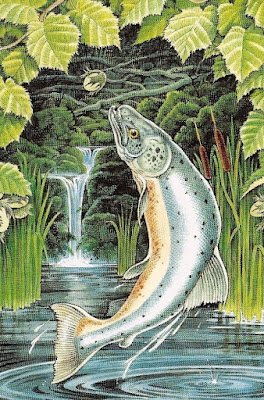A Halloween Tale
Probably one of the most popular tales from the Fenian Cycle is the story of how the great Gaelic hero Fionn mac Cumhaill gained wisdom. Later stories tell of the Salmon of Knowledge in which the young Fionn gained his wisdom by accidentally tasting part of a magical salmon. However, an older version from the 8th century tells a different story:
“Fionn and his men the Fianna were was cooking a pig at Badhamair on the bank of the Siúir river, Cúldubh the son of Ua Birgge came from the sí fort on Femen and snatches it from them. For three nights Cúldubh did this but on the third occasion Fionn chased him to the sí fort on Femen. Fionn kills him with a spear throw as he entered the sí fort, so that he died over there. As Fionn stretched his hand towards him, an Otherworld woman inside, with a wet vessel in her hand after distributing drink just beforehand, tries to shut the door. As she closed the door on the sí fort, and Fionn inserted his finger between the door and the post. Then he put his finger into his mouth. When he took it out again he began to utter an incantation; mystic knowledge illuminated him.”
Other variants of this old tale claim that it was Fionn’s thumb that the door to the Otherworld closed on and he then put it in his mouth. Either way, it is clear that the digit, thumb or finger was the only part of Fionn’s body that entered the Otherworld and therefore the carrier of knowledge.
Dáithí Ó hÓgáin sees the idea of Fionn entering the Otherworld, a visit to world of the dead at Halloween, as the background to the tale, surviving only obliquely in the older tradition.
Slievenamon
In this tale the Otherworld being called Cúldubh (literally “black-haired”) comes out of the cairn (sí fort or sidhe) on Slievenamon, the "mountain of the women". This mountain seems very apt for the tale.
The mountain of Slievenamon rises 2,365 ft out of a plain known in Old Irish as Mag Femin, or the Plain of Femen. The mountain is steeped in folklore associated with Fionn mac Cumhaill. The remains of prehistoric burial cairns, seen as portals to the Otherworld, are strewn across the summit. One of these ancient burial cairns, with a natural rocky outcrop on its east side, has the appearance of a doorway. This may be where Fionn is said to have trapped his finger in pursuit of Cúldubh.
There is evidence of a ceremonial avenue leading up to the cairn from the east. Another burial cairn and a ruined megalithic tomb are sited on the mountain's north-east shoulder. These burial cairns are known as Síd ar Femin (Sí ar Feimhin, the "fairy mound over Femen") and were seen as the abodes of gods and entrances to the Otherworld.
The Salmon of Knowledge
By the 12th century the old story above seems to have been largely forgotten and replaced by the tale of the Salmon of Knowledge.
A poet named Finnéices (“éices” meaning “seer”, possibly an ancestor of Fionn), commonly called Finnegas, had been on the Bóinn (River Boyne) for seven years seeking the salmon of Féc’s Pool, for it had been prophesied to him that he would eat this fish then nothing would remain unknown to him after that. The young Fionn, known here by the name "Demne", when seven years old was being tutored by this old man to learn the art of poetry.
The salmon itself may have received its wisdom by eating the nuts of hazel trees which had dropped into the Bóinn. The hazel tree is particularly associated with magic and folklore and its nuts were believed to hold concentrated wisdom.
The old man finally caught the salmon he had been waiting for and told Demne to clean and cook it, warning the young lad that he must not taste it, as he knew that the first one to taste the fish would gain its special knowledge. As Demne was cooking the fish, he burnt his thumb and immediately put it in his mouth to ease the pain. When he took the salmon to Finnegas, the old poet immediately noticed a difference in his young pupil’s face and asked if he had eaten anything of the salmon? Speaking the truth Fionn said that he had not eaten the salmon, but had burnt his thumb and put it to his mouth. Finnegas knew then that Demne had absorbed eternal Knowledge and was to become a great man and he then named him “Fionn” from that point on.
Reference:
Dáithí Ó hÓgáin, Fionn MacCumhaill: Images of the Gaelic Hero, Gill & Company, Dublin, 1988.
* * *


No comments:
Post a Comment
Note: only a member of this blog may post a comment.